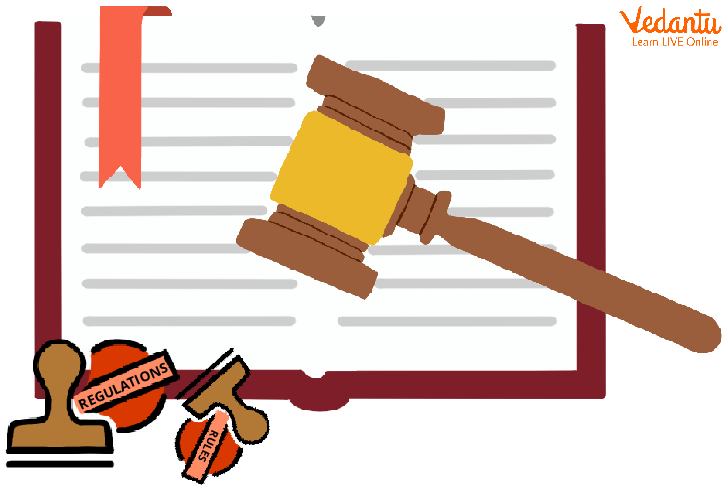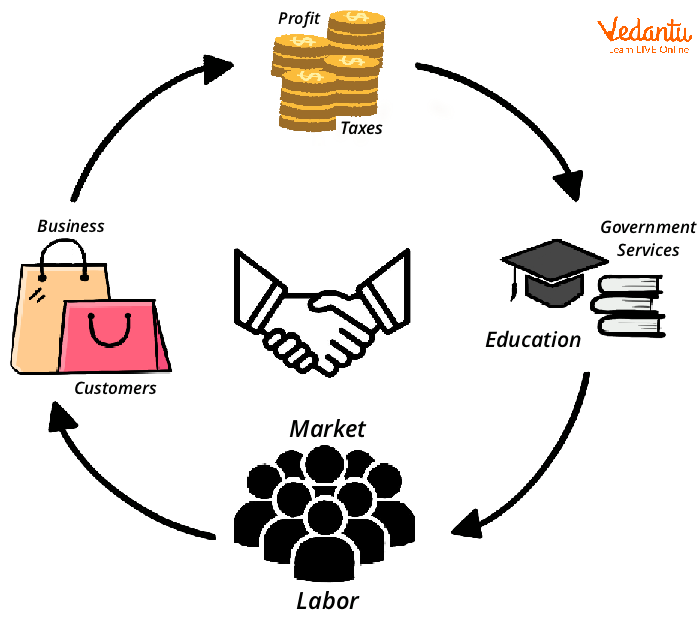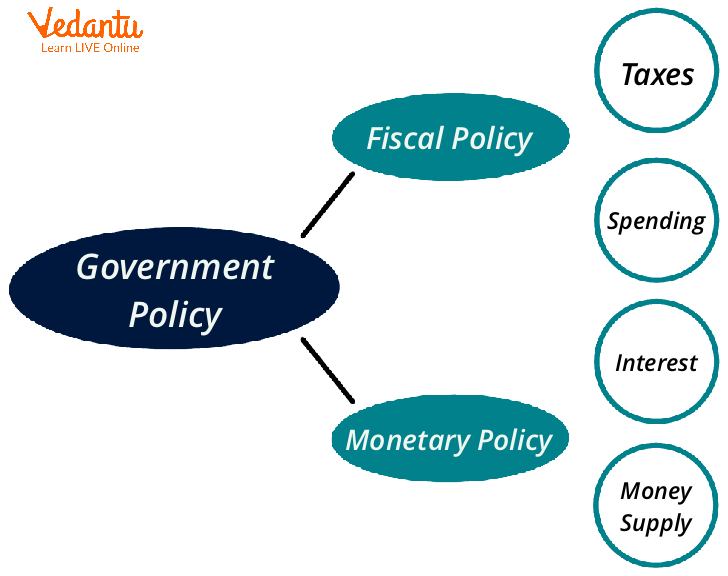




Government Policy
Government is a structure governing an arranged community and usually comprises legislature, executive, and judiciary. Government policy is an announcement of government political activities, schemes, and targets relating to a particular purpose. Free markets are often assumed to have a minute to no government intervention. However, governments intercede to stabilise markets, synchronise transactions, set up institutional frameworks, and impose contract law and property rights regulations. When markets break down, governments can intervene with bailouts and other measures.
Governments have the position to make extensive changes to monetary and fiscal policy, raising or lowering interest rates, which has an enormous impact on business.

Role of Government
They can uplift the currency, which temporarily raises corporate profits and share prices but eventually lowers values and penetrates interest rates. Governments can intercede when corporations or entire segments of the economy lack or threaten to erode the whole economic system by providing rescue.
Governments can make subsidies, taxing the general and giving the money to an industry, or tariffs, adding taxes to foreign products to raise prices and make domestic products more alluring. Higher taxes, fees, and greater regulations can impede businesses or entire industries.
Impact of Government Policy on Business
Government policies carry the rationale for things to be finished in a definite way and the cause for doing in that direction. Public problems can occur in limitless ways and require non-identical policy responses.
Governments put in place many policies that lead the way to businesses. The government can amend the fiscal policy, which provokes changes in taxes, commerce, subsidies, regulations, interest rates, licensing, and more. Businesses should be supple enough to respond to changing rules and policies.
Government policies are material at all levels, from national to local levels, such as states and municipalities. These local authorities have their own sets of laws. There are some international treaties which can shape the way corporations do business.
Governments get revenue to disburse from the taxes. Increased disbursement requires increases in taxes or borrowing. Any tax increase will dishearten investment, especially among business people who take the chance of starting and managing businesses. Increased expenses also eat into the limited pool of funds, leaving less money for private investment.
How Government Policy Affects Business
The government policy can affect how much tax the section pays, pensions, relocation status and laws, penalties or fines for violation of rules, education system, business and trade in an economy.

Role of Government in Business
The government executes a policy that changes social behaviour in the business environment. The government can penetrate agreements to evolve new technology to bring the required change. A decrease in private investments reduces the production of goods and services. That, as a result, may lead to unemployment.
Government policy can affect interest rates, which increases borrowing costs. Higher rates will lead to reduced consumer spending, but lower interest rates attract investments as businesses increase production. Businesses can not prosper when there is a high rate of inflation.
Government Intervention in the Economy
Government intervention refers to government involvement in the marketplace. Demand and supply forces in the free market often cannot establish allocative and productive efficiency. On this occasion, the government decides to step up and intervene.
The government takes this regulatory step to try and overcome market failure. It aims to replace the decisions made by individuals, groups, and organisations about social and economic matters.

Government Policy
When policymakers look to influence the economy, they have two main tools: monetary policy and fiscal policy. Central banks indirectly aim at activity by impacting the money supply through adjustments to interest rates, the buying and selling of government securities, bank reserve requirements, and foreign exchange. Governments impact the economy by changing the level and types of taxes, the extent and composition of investment, and the degree and form of borrowing.
Governments influence directly and indirectly the way resources are used in the economy. A basic equation of national income accounting that calculates the output of an economy or gross domestic product(GDP), according to spending, is given below:
GDP = C + I + G + NX
GDP is the value of all the final goods and services manufactured in the economy. On the right side, there are the sources of aggregate expenditure or demand - private consumption (C), private investment (I), goods and services purchased by the government (G), and exports fewer imports (i.e., net exports, NX). This equation makes it clear that governments affect economic activity (GDP) through their policies, controlling G directly and impacting C, I, and NX indirectly. Fiscal policy is called expansionary or “loose” if it increases aggregate demand directly through an increase in government spending. By contrast, if fiscal policy reduces demand via lower spending, it is often considered contractionary or “tight.”
Role of Government in an Economy
In an economy, the government plays a very critical role.
It Provides a Well-Functioning Political and Legal System.
The government provides the legal framework and services required for a market economy to operate effectively and efficiently. The legal framework lays out the legal status of business enterprises, certain the rights of private ownership, and allows the drafting and enforcement of contracts. Government interference is presumed to improve the allocation of resources.
Maintaining Competition
Competition is the basic regulatory tool in the market system. When businesses face competition in the market for customers, it results in lower prices, high-quality goods at reasonable prices, and more innovation.
Redistributing Income
Redistribution assumes both benefits and costs. The proposed benefits are greater “fairness”; the proposed costs are fewer incentives to work, save, invest, and produce, which results in a loss of total output and income. The government uses the personal income tax to take a larger amount of the income of the rich than of the poor, thus reducing the after-tax income difference between high-income and low-income earners. Redistribution involves taxes and giving them back through services, public goods, social security, aid for the disabled etc.
Reallocating Resources
The government reallocates the resources through its budgetary policy to meet social and economic objectives. Private companies do not produce public goods like roads, bridges, parks etc. The government, to maximise social welfare, produces goods for public needs by allocating its resources.
Promoting Stability
Governments depend upon taxes, expenditures, and monetary regulation to strengthen macroeconomic growth and stability and to decrease unemployment rates and inflation while encouraging economic growth. If there is high unemployment, the government might increase government spending, reduce taxes, and/or increase the money supply. If there is high inflation, the government may reduce government spending, increase taxes, and/or reduce the money supply.
Case Studies
In Agra, the government subsidises the construction of sports stadiums to hold onto sports teams. Write an argument for this government action, using the economic functions of the government in support of your answer.
Ans: Public support for sports stadiums might be regarded as an example of correcting for externalities. The economic argument for taxpayer-financed subsidisation is that the sports teams provide substantial external benefits. The city achieves visibility that might allure new businesses and visitors who will spend money in the city. Thus, many people benefit, including those who never attend stadium events.
Summary
Governments play an important role in the financial world. Regulations, subsidies, and taxes can have immediate, long-lasting impacts on companies. For this reason, legal and political risk is considered a notable factor when pricing stocks. A good investment can turn out to be not that efficient if it's at risk of seeing its competitive advantage and profits diminish as a result of certain government actions. Political factors play an important role before going into any business.
FAQs on Impact of Government Policies on Businesses
1. What is meant by government policy in the context of business?
In a business context, a government policy is a declared plan of action or set of principles adopted by the government to achieve specific economic and social goals. These policies create the legal and institutional framework within which businesses must operate. Key examples include monetary policy (managing money supply and interest rates), fiscal policy (concerning government taxation and spending), and industrial policy (guiding the growth and regulation of specific industries).
2. What are the major impacts of government policy changes on business and industry?
Changes in government policy can have a profound impact on business and industry, forcing them to adapt their strategies and operations. Key impacts include:
- Increasing Competition: Liberalisation and deregulation can lead to new players, including foreign companies, entering the market, intensifying competition.
- More Demanding Customers: A competitive market often leads to better-informed and more discerning customers, who demand higher quality and better service.
- Rapidly Changing Technological Environment: Policies promoting technology or foreign investment can force businesses to adopt modern technologies to remain competitive.
- Necessity for Change: Businesses must continuously modify their policies and operations in response to the dynamic economic environment shaped by the government.
3. How did the 1991 economic reforms in India impact businesses?
The 1991 economic reforms in India, centred on Liberalisation, Privatisation, and Globalisation (LPG), fundamentally changed the business landscape. The key impact was a shift from a controlled to a market-driven economy. This resulted in the end of the 'licence raj', increased competition from multinational corporations, and a reduced role for the public sector. Indian firms had to adopt a more market-oriented approach, focusing on customer needs, efficiency, and technological upgrades to survive and grow.
4. Can you provide examples of how specific government policies affect a business's day-to-day operations?
Certainly. Specific policies directly influence daily business functions in various ways:
- Taxation Policy: An increase in corporate tax rates directly reduces a company's net profit. Conversely, tax incentives for specific sectors, like manufacturing, can encourage investment and expansion.
- Environmental Regulations: Stricter emission standards may require a company to invest in new, costly equipment, affecting its production costs.
- Labour Laws: Policies on minimum wage, working hours, and employee benefits directly impact payroll expenses and human resource management.
- Trade Policies: Tariffs on imported raw materials increase a company's input costs, while free trade agreements can open up new export markets.
5. Why is it essential for businesses to closely monitor changes in government policies?
It is essential for businesses to monitor policy changes not just for compliance but for strategic survival and growth. Policy shifts can present both significant threats and opportunities. For instance, a new subsidy could make a project financially viable, while a sudden import ban could disrupt an entire supply chain. By staying informed, a business can adapt its strategies proactively, manage risks, and even gain a competitive advantage by being the first to capitalise on new policy-driven opportunities.
6. What are the potential positive and negative impacts of government intervention in an economy?
Government intervention has both positive and negative consequences for businesses and the economy.
- Positive Impacts: Intervention can correct market failures, such as by regulating monopolies to ensure fair prices. It also provides essential public goods like infrastructure (roads, bridges) that benefit all businesses, and it can redistribute income through taxes and welfare to ensure social stability.
- Negative Impacts: Excessive regulation can create high compliance costs, stifle innovation, and lead to government failure where intervention causes more inefficiency. It can also create an uncertain environment if policies change too frequently.
7. How do monetary and fiscal policies differ in their impact on businesses?
Both policies influence the economy, but they work through different channels. Fiscal policy involves the government's direct use of taxation and spending. For example, lowering taxes gives consumers more spending money, boosting demand for a business's products. Monetary policy, managed by the country's central bank (like the RBI in India), influences the money supply and credit conditions. For instance, raising interest rates makes borrowing more expensive for businesses, potentially slowing down expansion plans and investments.
8. Beyond just reacting, how can a business strategically leverage government policies for growth?
Proactive businesses can move beyond simple compliance and use government policies as a strategic tool. This can be done by:
- Aligning with National Priorities: Focusing research and development (R&D) or new ventures in areas the government is promoting, such as renewable energy or digital infrastructure, to access grants and subsidies.
- Utilising Trade Agreements: Actively exploring export opportunities in countries where the government has signed favourable trade deals.
- Public-Private Partnerships (PPPs): Collaborating with the government on large-scale infrastructure or social projects to secure long-term revenue streams.
- Providing Feedback: Engaging with industry associations to provide feedback and help shape future policies in a way that benefits the entire sector.
9. Is it true that a 'free market' economy has no government intervention at all?
This is a common misconception. No modern economy operates with zero government intervention. Even the most free-market-oriented economies rely on the government to perform crucial functions that enable the market to work effectively. These include establishing and enforcing property rights, upholding contract law, ensuring national defence, and providing a stable currency. Without this foundational legal and institutional framework provided by the government, a complex market economy could not exist.





































